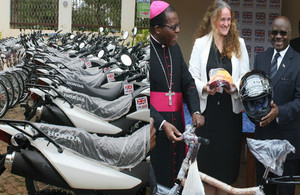DFID hands over motorcycles and bicycles to support primary justice
A total of 3100 Community Based Facilitators, 60 lay magistrates and 100 Court Clerks and Marshalls will benefit and serve better the most vulnerable members of Malawi.

Ziyaye, Jen Marshall and Nyirenda
In a bid to ease mobility challenges for its partners when working to ensure increased access to justice for most vulnerable members in society, the Department for International Development (DFID) has, through its Justice for Vulnerable Groups (JVG) Programme, presented 3100 bicycles to the Catholic Commission for Justice and Peace (CCJP) and 60 motorcycles and 100 bicycles to the judicfiary.
Since 2011, the UK has, through JVG, supported community and district mechanisms to prevent violence against women and children and support traditional and formal justice systems to be more accountable and responsive to women, children and detainees.
3100 bicycles that have been handed over to CCJP will support a nationwide network of community based educators (CBEs) to effectively carry out their work in the community of training local tribunals, supporting citizens to access justice and resolving local disputes.
On the other hand, the 60 motorcycles and 100 bicycles that have gone to the judiciary will, respectively, support lay magistrates to be more responsive to the needs of people in rural areas and Court Clerks and Court Marshalls to deliver summons, coordinate court camps and expedite the justice process.
DFID’s Head of Office in Malawi, Jen Marshall, said the donation of bicycles and motorbikes will help ensure sustainability of everybody’s efforts to date to increase access to justice for the most vulnerable.
Marshal said:
The UK’s investment moving forward will build on the results to date, focusing specifically on the major challenge of gender-based violence which affects so many women and children in Malawi. We aim to support interventions to prevent gender-based violence in the first place, and will also support survivors of violence to have access to improved justice services.
Representing CCJP during the handover of the bicycles, the Archbishop of Lilongwe Diocese Tarcizio Ziyaye thanked the UK government for equipping CCJP’s officers with bicycles to effectively do their job in rural areas. For his part, the head of Malawi Judiciary, the honourable Chief Justice Andrew Nyirenda SC, said the assets would help the judiciary to reach the greater part of community that is in rural areas.
Justice Nyirenda said:
These motorcycles and bicycles will certainly allow us to take justice to the greater part of our community where we have the majority of the vulnerable groups. In distributing these resources, we must therefore undertake to mainly target rural courts; that we will do.
Achievements under the Justice for Vulnerable Groups Programmes
JVG has come to a close in 2017 and a new gender-based violence programme will be launched sometime in the year. In the just-ended programme, the UK worked with four main partners—the Paralegal Advisory Services Institute (PASI), UNICEF, CCJP and the Judiciary.
PASI
PASI’s work focused on reducing pre-trial detention and contributed to a reduction in the average duration of pre-trial detention from 3 years to 6 months. This has helped ensure that there are no children in prison and that no children are kept in police cells for more than 48 hours.
Support to UNICEF
Support to UNICEF mainly focused on strengthening the Malawian child protection system to prevent and respond to violence, abuse, exploitation and neglect of women and children. Police Victim Support Units and Community Support Victim Units have been set up across the country to respond to cases involving women and children specifically. UNICEF has trained over 400 police officers in violence against women and girls handling and case management. Currently, more women and families are using the Victim Support Unit Services, indicating increased satisfaction among users.
The Malawi Judiciary
The Malawi Judiciary played a crucial role in increasing access to justice and reducing pre-trial detention and prison congestion by training and deploying 57 lay magistrates to rural areas. This has been successfully done with all trained magistrates deployed, including to remote areas such as Nyungwe and Mlowe in Karonga. The judiciary also provided tailor made courses for already trained magistrates and court officials on remand orders, community service orders and non-custodial sentencing options, including sentencing for petty offences and first-time offenders. In addition, they have conducted camp courts and Court User Committee meetings which have helped reduce prison congestion.
The Catholic Commission for Justice and Peace (CCJP)
CCJP has been the key partner in the programme for delivering the Primary Justice component, working with traditional and informal justice mechanisms in all 28 districts across the country and in 155 Traditional Authorities. CCJP has a national network of 3100 Community Based Educators who train local tribunals, support citizens to access justice and are a key player in resolving local disputes. As a result of this programme, women are now represented on all local tribunals across the country, cases are being recorded which has helped build trust in these important local institutions. 60% of women who have brought land disputes to local tribunals have had cases resolved in their favour.